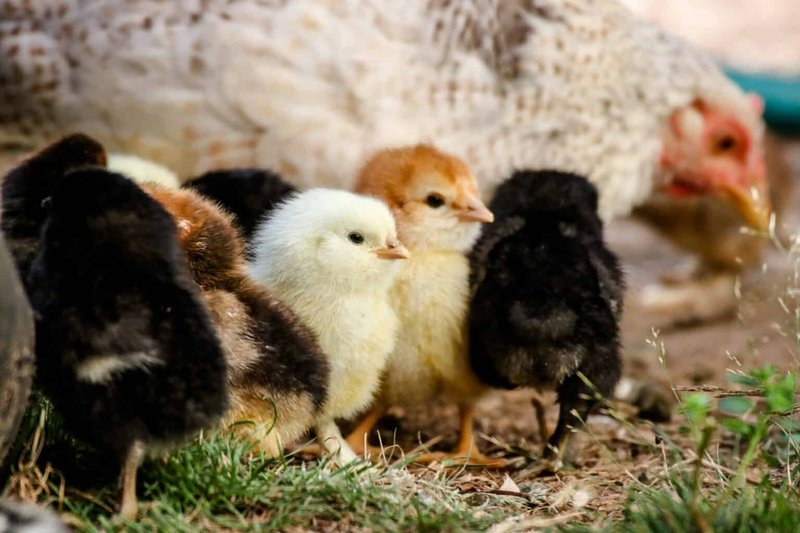
So, what do chickens eat, and how do they forage? Let’s dive into the chicken diet, explore their hunting behavior, and discover some interesting facts about these feathered friends. You might be surprised at how adaptable and resourceful they really are!
The Basics of a Chicken’s Diet
Chickens are omnivores, which means they eat both plants and animals. This gives them a wide range of food options. In the wild, their diet typically includes grains, seeds, insects, and small animals. But when kept domestically, chickens often have a more controlled diet.
Chickens usually enjoy:
- Grains: This includes corn, wheat, and oats, which provide essential carbohydrates.
- Insects: They love to munch on bugs like crickets, grasshoppers, and even worms.
- Greens: Chickens are quite fond of leafy greens like lettuce, kale, and dandelion leaves.
- Fruits: They can safely eat many fruits, such as berries, apples, and melons.
When chickens are foraging, they instinctively know to look for a combination of these foods. Their keen eyesight allows them to spot small items on the ground, making them nature’s little foragers.
How Chickens Forage: The Hunting Techniques
You might wonder how these birds go about finding their food. Chickens use a combination of sight, sound, and instinct to hunt for their meals. They regularly scratch the ground with their feet, moving leaves, dirt, and debris aside to uncover hidden treats. It’s kind of like the way you’d sweep a table for crumbs—only they’re much more thorough!
These birds are equipped with a unique adaptability that allows them to search for different types of food based on their environment. Here’s how they do it:
- Scratching: This is their signature move. Chickens scratch the ground to dig up insects and seeds buried in the soil.
- Pecking: They tend to peck at larger items, like fruits or grains, using their beaks to break them apart.
- Listening: Chickens can hear the sounds of insects beneath the ground, which helps them know where to dig.
One interesting fact is that chickens don’t have teeth, so they rely on their gizzards—muscular parts of their stomachs—to grind up food. They often swallow small pebbles to aid in this process, helping them break down harder food items.
What Chickens Eat in Different Seasons
A chicken’s diet can look quite different depending on the season. In spring and summer, they can feast upon a bounty of fresh greens, insects, and grains. However, in the colder months, when food is sparse, their diet may shift to include more grains and stored feed.
During the warmer months:
- High Protein: Chickens tend to consume a lot of insects, which are abundant.
- Fresh Vegetation: They enjoy pecking at young plants and vegetables.
Conversely, in the winter:
- Pelleted Feed: Many chicken owners provide a nutrient-rich pelleted feed that assures their birds receive essential vitamins.
- Stored Grains: Chickens rely on grains or seeds stored from the harvest season.
This seasonal variation is important. Chickens are good at adapting their diet according to what’s available and, if you think about it, that strategy helps them thrive in various environments.
The Role of Supplementary Feeding
While foraging is essential, many chicken owners choose to provide supplementary feed to ensure their birds receive adequate nutrition. This is especially crucial for domesticated chickens that might not have the same foraging opportunities as their wild counterparts.
Supplemental feeding typically includes:
- Commercial Chicken Feed: This feed is specially formulated to include the right balance of proteins, carbohydrates, vitamins, and minerals.
- Kitchen Scraps: Many people toss leftover fruits, vegetables, and grains to their chickens, giving them a tasty treat.
Providing a balanced diet helps promote healthy growth, egg production, and overall well-being. It’s like giving your chickens their own version of a balanced dinner plate!
Foraging Behavior and Social Dynamics
Chickens aren’t solitary creatures; they thrive in social groups called flocks. Their foraging behavior is often influenced by the dynamics within their flock. When one chicken finds a good food source, you may notice the others quickly follow, creating a sort of foraging party!
Chickens communicate with each other using various sounds, and this communication helps them work together to find food. If a chicken spots a juicy worm or a patch of greens, it might make a special clucking sound to alert its friends.
This social aspect of foraging emphasizes their adaptability. They learn from each other, which can lead to improved foraging efficiency over time. Pretty neat, right?
Common Myths About Chicken Diets
There are a few common misconceptions about what chickens can and cannot eat. For example, some people believe that chickens should only eat grains or only commercially prepared feed. However, as we’ve discussed, chickens thrive on a varied diet that includes both plant and animal matter.
Here are a few myths debunked:
- Myth 1: Chickens can eat anything. Fact: While they are omnivores, some foods are toxic to them, such as chocolate, avocado, and certain plants.
- Myth 2: Chickens will only eat grain-based feed. Fact: They enjoy a diverse diet and can benefit from fresh fruits and vegetables.
Understanding the truth behind these myths is vital for providing a safe and balanced diet for your chickens.
Caring for Your Chickens’ Diet
If you’re new to chicken keeping, it’s important to consider how to ensure your flock gets a balanced diet. Here are some tips to help you out:
- Observe Their Behavior: Watch how they forage and what they seem to enjoy. This can guide you in providing a diverse diet.
- Quality Feed: Choose high-quality commercial feeds that meet the nutritional needs of your chickens.
- Supplement Gradually: Introduce new foods slowly to avoid digestive issues.
By keeping an eye on your chickens and adjusting their diet as needed, you can help them live happy, healthy lives. It’s all about finding that balance!
In conclusion, understanding what chickens eat and how they hunt or forage is essential for anyone interested in raising these remarkable birds. They have a dynamic and varied diet that reflects their adaptability and natural instincts. Whether your chickens are foraging for themselves or you’re supplying their meals, a well-rounded diet is key to their health and happiness. Happy chicken-keeping!

